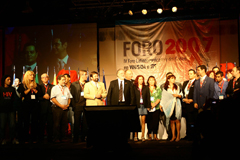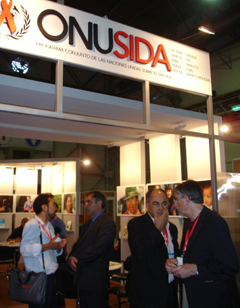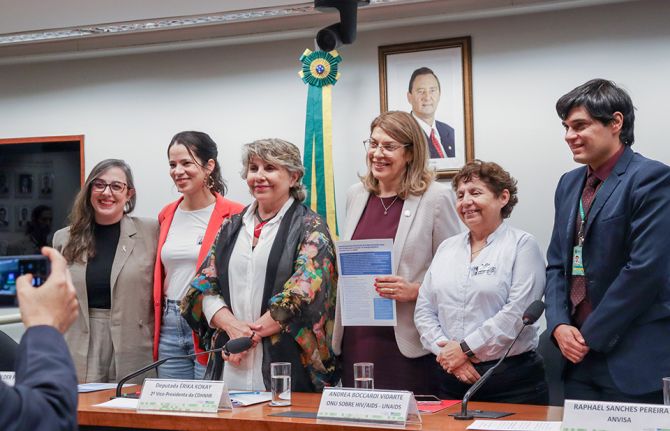
Feature Story
FORO 2007 closes in Buenos Aires
27 April 2007
27 April 2007 27 April 2007
More than 4,000 people participated in the four-day
forum that came to a close on 20 April 2007 in
Buenos Aires.
The IV Latin American and Caribbean Forum on HIV/AIDS and STD’s came to a close on 20 April 2007 in Buenos Aires. More than 4,000 people participated in the four-day forum where people living with HIV, civil society groups, non-governmental and governmental institutions, academia, media and UN agency representatives came together to share ideas and discuss challenges and opportunities in the response to AIDS and sexually transmitted diseases in the region.
“This forum has been instrumental in increasing the visibility of the AIDS epidemic in the region,” said Dr. Cesar A. Nunez, UNAIDS Regional Director for Latin America.
Dr. Karen Sealey UNAIDS Regional Director for Caribbean added, “During this forum Governments, civil society and strategic partners have been called upon to continue unifying efforts and resources in the response to HIV in the region.”

Dr. Cesar Nunez, UNAIDS Regional
Director for Latin America
highlighted the role of the forum in
increasing the visibility of the AIDS
epidemic in the region.
The International Centre for Technical Cooperation on HIV/AIDS (ICTC) a joint Brazil/UNAIDS initiative played a key role in organizing satellite sessions and side meetings focusing on commitment to providing technical assistance to countries and civil society groups in the region. The event also provided the setting for a meeting of the Coalition of First Ladies and Leader Women on AIDS.
Argentina ’s Minister of Health, Dr. Ginés González García and Dr. Mirta Roses, Director of the Pan American Health Organization underlined their commitment to overcome the challenges in the response to AIDS during their speeches at the closing ceremony.
“ Argentina will continue working with the countries of the region in finding the best prices for the drugs needed in order to improve access to treatment,” said Dr. González García. “Only these actions will help achieve the goals we have for the upcoming years,” he added.
Dr. Roses, speaking on behalf of the United Nations agencies said, “HIV has to be taken to the highest point in the political agenda, if not, our response will be too late. Poverty and social inequities relating to gender and ethnic groups need to be addressed as issues that are fuelling the AIDS epidemic in our region.”

The forum has been an excellent platform
to share ideas and discuss challenges in
the response to AIDS in the region.
One of the important considerations at the forum was the discussion around the topical issue of male circumcision as an additional HIV prevention tool. Participants were united in recommending that male circumcision should not be seen as a stand alone prevention method and that it should only be considered and recommended as part of a comprehensive prevention package which should include correct and consistent use of condoms and a reduction in the number of sexual partners.
The forum is a bi annual initiative of the Horizontal Group of Technical Cooperation. It´s organising committee includes representatives of the regional civil society networks: ICW LATINA, REDTRASEX, ASICAL, REDLA+, MLCM+, REDLARD, LACASSO, REDLACTRANS.
The main outcomes included;
- Strengthening HIV prevention and promoting sexual health
- Ensuring that human rights for children and young people are integrated into the HIV response in the region
- Increasing HIV prevention programmes for people at higher risk of HIV infection including; men who have sex with men, sex workers, transpopulations, prisoners and people who inject drugs
- Generating public policies that guarantee gender identity and the reduction of stigma, as well as policies on human rights vulnerabilities such as poverty, ethnic groups and gender
- Strengthening the inclusion and participation of women in the response to the epidemic
- Promoting the monitoring and evaluation of access to treatment
- Reinforcing epidemiological surveillance and including civil society in the processes
- Setting targets towards the 2010 goal of universal access
- Ensuring adequate strategic planning, the will to ensure the mobilization of funds for implementation and successful monitoring and evaluation in countries
During the closing session, Andrés Leibovich, President of Foro 2007, made a symbolic transfer of the forum’s organising committee to representatives from Peru, who will be hosting the V Latin American and Caribbean Forum in 2009. The Peruvian delegation was headed by Dr. José Luis Mesones, Peru’s National Aids Coordinator.



